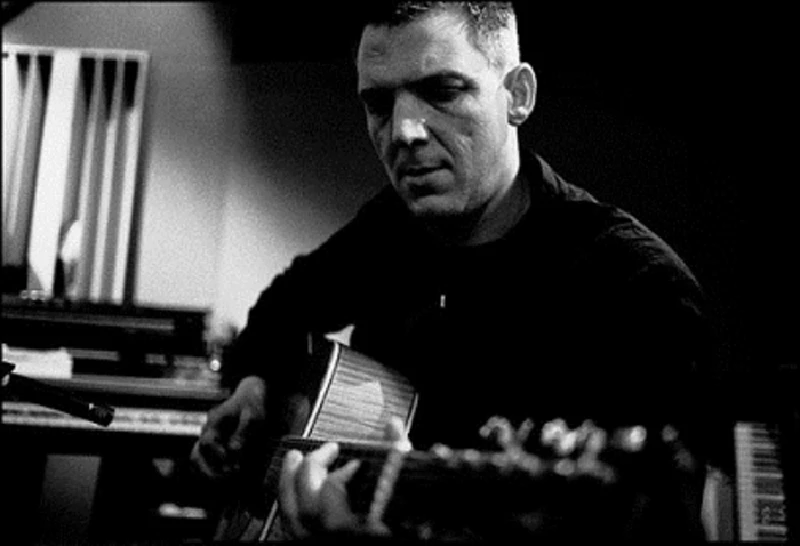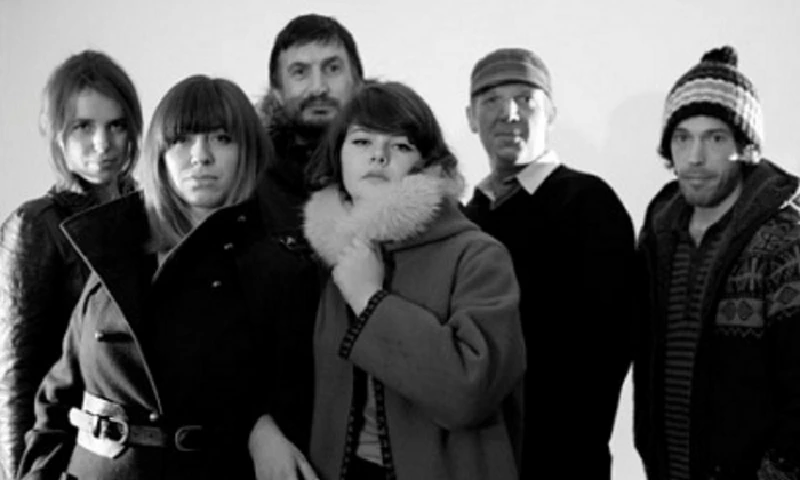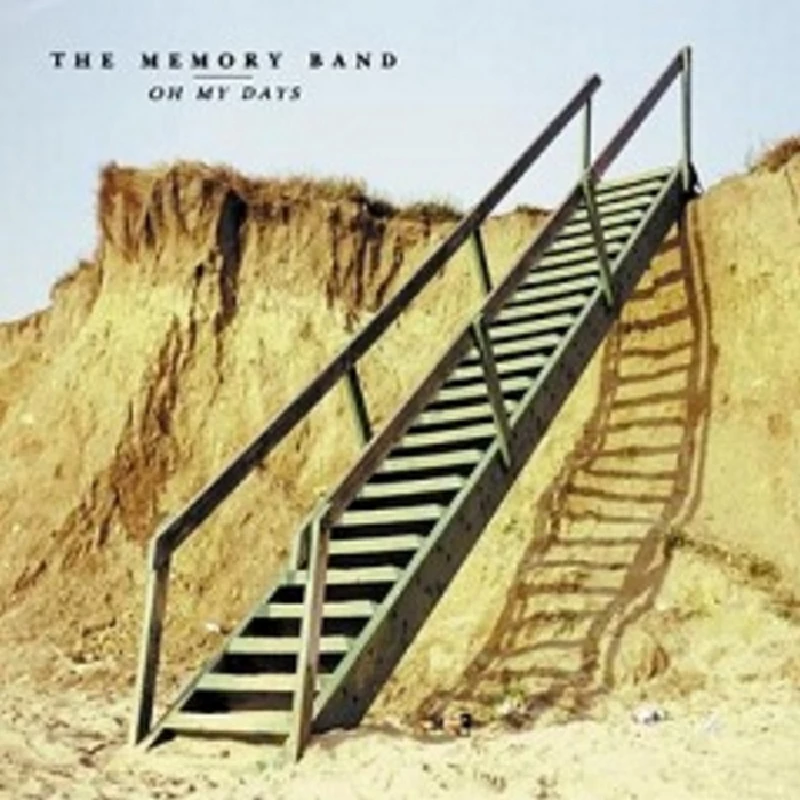Memory Band - Interview
by John Clarkson
published: 20 / 3 / 2011

intro
The Memory Band is a electro-folk project centred around London-based guitarist, singer-songwriter and producer Stephen Cracknell. John Clarkson speaks to him about the revolving nature of his group and their just released third album, 'Oh My Days'
The Memory Band is a rotating electro-folk project centred around London-based guitarist, singer-songwriter and producer, Stephen Cracknell, and an ever fluid line-up of musicians. Since forming the Memory Band in 2003, Cracknell has released three albums under the moniker, ‘The Memory Band’ (2003), Apron Strings' (2006) and, after a five year gap during which he concentrated on his other band The Accidental (who put out an album,‘There Were Wolves', in 2008), ‘Oh My Days’ in February. ‘Oh My Days’, as well as Cracknell, features twenty other musicians who float in and out of its fourteen songs, which consists of eleven Cracknell originals, and three covers of songs written by Sandy Denny (‘By the Time It Gets Dark’), Jeff Alexander (‘Come Wander With Me’) and Graham Bond (‘Love Is the Law’). The impressive list of musicians involved with ‘Oh My Days’ includes, among others, Radio 2 Folk Award nominee and singer/guitarist Nancy Wallace; Tunng front man Sam Genders; Bicycle Thieves vocalist Hannah Caughlin; Nottingham-based musician Liam Bailey; singer-songwriter Dot Allison; former Fridge bassist and solo act Adem and acclaimed harpist Serafina Steer. Like its unusual and unique sleeve which has a photograph of a short wooden walkway leading down from a sandy dune to a beach, ‘Oh My Days’ is quietly forceful, its low-key electronic pulses and understated guitar melodies revealing on each fresh listening elements, as well as folk, of jazz, soul, gospel and country blues. The Memory Band have recently been playing dates across Britain, performing songs and music from Paul Giovanni’s score from the 1973 classic horror film, ‘The Wicker Man’. Pennyblackmusic caught up with Stephen Cracknell between shows to talk to him about ‘Oh My Days'. PB : You have spent the last few years focusing your energies on your other band, the Accidental. ‘Oh My Days’ features appearances from all the main players in the Accidental, yourself, Hannah Caughlin, Sam Genders and Liam Bailey. At what point do the Accidental and the Memory Band depart from each other? SC: ‘The Accidental’ was just an album, a project, which was started by myself and Sam Genders and that in which we through the process of making the record also involved Liam Bailey and Hannah Caughlin. In a sense that was a four piece unit, while the Memory Band, in which I am also the producer and the band leader, is an ever changing thing. PB: What’s the process of keeping things rotational with the Memory Band? Is it just to keep things fresh for yourself? SC: It’s a combination of things really. The core of it has always been that I don’t want it to be just a solo project. It is always about playing with other people and bringing their musicianship and their skills to the fore as well. I also like the idea of it being a changing, revolving thing. One of the things that I was keen to do when I began the Memory Band was to do something that couldn’t be pitched in fifteen seconds. I don’t want to say pre-packaged, but I didn’t want to have, if you like, a pre-designed, complete object. There is a lot of pressure to do that in the music industry. That’s the way you’re supposed to make it as a band. PB: A lot of other bands come unstuck because, if you’re in a regular group, you often have to be very dependent on the other members. You seem to have a fluidity which perhaps other groups don’t have. SC: That is the decision I made to work with, and there are good and nd bad points to it. I really, however. enjoy it and it does allow people to do things slightly differently. PB: You’re the songwriter on most of the songs on the new album. Do you go away and write the outline to a song and then bring it to musicians who improvise on it or does it work in another way? SC: On ‘Oh My Days’, I tried to construct the compositions in different ways in that it was no longer just me sitting down with the guitar as I had done in the past. I used computers and loops to start ideas as well. On this album on songs like ‘A New Skin’ with Jess Roberts and ‘Demons’ with Liam Bailey I wrote just instrumental tracks, and sent them to them and asked them to respond to them vocally. I hadn’t really done that much before either. PB: How do you decide who is going to play on what? Is it just who is available? SC: (Laughs) Everything is a balance. It is a balance between who is available and who I think will work. You’ll find different people will sing the same song the different times that we will play live. It has been our aim since the very first album, ‘The Memory Band’, of trying to use very simple lyrics to be sung by anyone, not even necessarily a trained singer and which also suit people singing together. They can be sung by an individual or by three people or five people or even a room singing together in unison and harmony. PB: The first time that you listen to ‘Oh My Days’ it seems a very simple album in its arrangements, yet when you listen to it on subsequent occasions you realise that there is lot more going on there. Was that what you were aiming for with this record? SC: That is part of what I do. If the Memory Band is to to be called folk in anyway, it is because of that idea of our music being a simple, approachable thing, but then being quite complex about it and developing it in all kinds of different ways in terms of technology and improvisation, and also at times being slightly experimental, although we don’t do the avant-garde thing. It is about bringing in all kinds of things and influences into something that on first listen seems very simple. It is interesting to see how people react to it because you can see in reviews that if you listen to what I do once you might miss a lot of stuff. That’s fine though. I don’t mind that. PB: Why did you decide to call the album ‘Oh My Days’? SC: For one thing, I love the phrase for linguistic reasons. It is a modern phrase. I love the sound of it. I love the fact that it is incredibly modern. It is a kind of street thing, but at the same time it sounds archaic. It sounds to me like something that could come out of the sixteenth or seventeenth century and it has a kind of beautiful quality to it. Lyrically as well I think it deals quite a bit with the kind of things that make people say ‘Oh My Days’, big emotions and stuff. PB: There is a debate on the internet about ‘Some Things You Can’t Hide’. Is that about the beginning or the end of a relationship? SC: (Laughs). It is Dot Allison, Hannah Caughlin and myself all singing. I have read those reviews also, but it is not actually about a relationship at all. The first line came from the guitar line, so in this case lyrics follows music, but what I focused in on was someone I know socially, and that very kind of English thing of knowing someone clearly has a problem with you, but they are not going to say it. At times it becomes awkward and you sit there and think, “Why don’t you just say what you are thinking?” That is where writing lyrics can be fun because whenever I write a lyric I try to construct a narrative, and what I usually do on a lot of songs is try and think who is singing this song and who it is to, and either build a back story or imagery in my mind and then very much try and think in character. A lot of the first person stuff that I do is actually more about voices and characters. I really like songs where the lyrics make me think and wonder who the person that is talking and who is the person that it is being addressed to. PB: A couple of other songs on the album also have a similar sly sense of humour as well. ‘What is the inspiration about ‘Ghosts’? SC: It is about living with ghosts. I don’t necessarily believe in ghosts. There are points in life where as you get older things happen that are somewhat traumatic. Sometimes they are good things as well as bad things. For whatever reason though you often end up mentally staying in the same place for some time afterwards as you were before. The idea of that song is about dealing with that process, and being surrounded by ghosts and just making friends with them. PB: There are three cover songs on the record, Sandy Denny’s ‘By the Time It Gets Dark’, Graham Bond’s ‘Love is the Law’ and Jeff Alexander’s ‘Come Wander With Me’. What is the appeal to you of those three songs? Why did you decide to put them on? SC: ‘By the Time It Gets Dark’ is something that we have played in the Memory Band for quite a while, since just after we did ‘Open Strings’, and Nancy Wallace, who sings on that version at the time, used to play originally in the live band. She would sing it and sometimes we would sing it together. I am not sure, but I think that song was only released in demo versions after Sandy Dennis’ passing. My favourite version of hers is the most simple, which is a demo of her singing while playing the guitar unaccompanied, and I thought that we could do something really good with it and something quite similar with Nancy singing on it. ‘Come Wander with Me’ was first sung by Bonnie Beecher and she originally did a version of it in a 1964 episode of ‘The Twilight Zone’. I first became aware of it when Vincent Gallo put a version of it into his film ‘The Brown Bunny’. As soon as I heard Hannah Caughlin singing, I thought that she should sing that song. A lot of what I do with the Memory Band, and, especially when we are recording, is to produce this idea of a fantasy record in the sense that you hear someone singing and you think, “Well, if I get them to sing that song, I am sure that it will be great,” and it often is. The Graham Bond song is a song that I have known for a long time. A couple of years ago I heard it again and I was just messing around with an open tuning at the time, and it just kind of clicked that that was something that I could sing. I mapped it out on a guitar with a synthesised chord structure, and what everyone is playing on there is improvised. The guitar, bass and drums were all recorded live in one room at the same time, and we just overdubbed with people improvising very freely and responding to what everyone else was doing. PB: Who provided the artwork and why did you decide to put that picture on it which shows a set of steps leading down to a beach? SC: The photograph was taken by a photographer who is a very dear old friend of mine called Nigel Rogers. All the Memory Band album covers use Nigel’s photography as the front cover. That is the constant theme of what we do. He just sends me photos and I choose them. The dialogue that we have always had about them is very simple, that I always use an image that is natural, a natural scene or something that is perceived as natural, but in fact somewhere in there there is the idea of something man-made. PB: You’re playing dates at the moment with the Memory Band doing songs from ‘The Wicker Man’. SC: It is a show that we have been doing for a couple of years. I have done a few things over the years with ‘The Wicker Man’ music, but in these shows we just do the music as a live set and play all the songs straight through. PB: What was the appeal to you of ‘The Wicker Man’ soundtrack? SC: It is such an incredibly well-written and well-arranged score. The other appealing thing is that I also like to do things that don’t just involve us making a record and then going on tour for eighteen months or two years, and playing the same songs every night to the same people. One of the reasons is that we have always done a lot of cover versions is that the Memory Band can go and do more than one thing. Probably at some point this year I’ll start thinking about developing another project involving the Memory Band recording material other than our own. I also have recently started a project called the Balearic Folk Orchestra with a film director called Kieran Evans, which is a similar kind of thing and finds us covering things from dance classics to Grace Jones and It’s Immaterial songs. I just enjoy doing different things. The great thing about ‘The Wicker Man’ though is the relation that that music has with its audience. The energy from that audience is fantastic. You start playing ‘The Landlord’s Daughter’ and people start singing along. It is great fun and creates a wonderful rapport with the audience. PB: What else are you going to be doing with the Memory Band this summer? SC: We going to be playing some shows and announcing shows across the year. We don’t put together tours. We’ll play continuously through the year here and there. We are talking to some festivals at the moment and just about to confirm a load of them. We try to do not just different and varied and interesting shows, but in different and varied and interesting places if we can. We are bored easily really. PB: Thank you.
Picture Gallery:-


most viewed articles
current edition
Carl Ewens - David Bowie 1964 to 1982 On Track: Every Album, Every SongArmory Show - Interview with Richard Jobson
John McKay - Interview
Colin Blunstone - Thalia Hall, Chicago, 16/7/2025
Billie Eilish - O2 Arena, London, 10/7/2025
Bathers - Photoscapes 1
Visor Fest - Valencia, Spain, 26/9/2025...27/9/2025
Loft - Interview
Sir Tim Rice - Interview
Robert Forster - Interview
previous editions
Manic Street Preachers - (Gig of a Lifetime) Millennium Stadium, Cardiff, December 1999Heavenly - P.U.N.K. Girl EP
Beautiful South - Ten Songs That Made Me Love...
Oasis - Oasis, Earl's Court, London, 1995
Peter Perrett - In Dreams Begin Responsibilities Interview Part One
Boomtown Rats - Ten Songs That Made Me Love....
Coldplay - Wembley Arena. London, 16/8/2022
Prolapse - Interview
Pixies - Ten Songs That Made Me Love...
Trudie Myerscough-Harris - Interview
most viewed reviews
current edition
Davey Woodward - Mumbo in the JumboSick Man of Europe - The Sick Man of Europe
Lucy Spraggan - Other Sides of the Moon
Amy Macdonald - Is This What You've Been Waiting For?
Phew, Erika Kobayashi,, Dieter Moebius - Radium Girls
Bush - I Beat Loneliness
Suzanne Vega - Flying With Angels
Alice Cooper - The Revenge of Alice Cooper
Cynthia Erivo - I Forgive You
Blueboy - 2
Pennyblackmusic Regular Contributors
Adrian Janes
Amanda J. Window
Andrew Twambley
Anthony Dhanendran
Benjamin Howarth
Cila Warncke
Daniel Cressey
Darren Aston
Dastardly
Dave Goodwin
Denzil Watson
Dominic B. Simpson
Eoghan Lyng
Fiona Hutchings
Harry Sherriff
Helen Tipping
Jamie Rowland
John Clarkson
Julie Cruickshank
Kimberly Bright
Lisa Torem
Maarten Schiethart